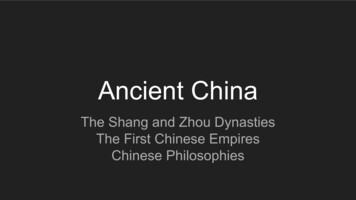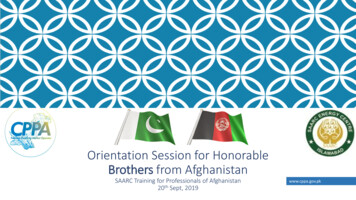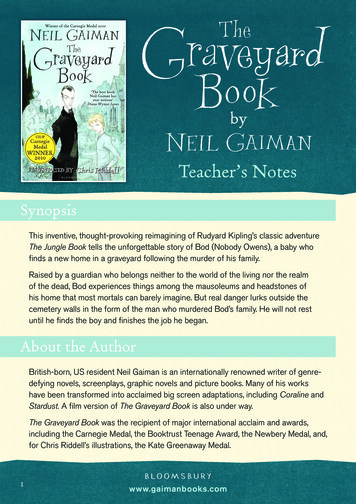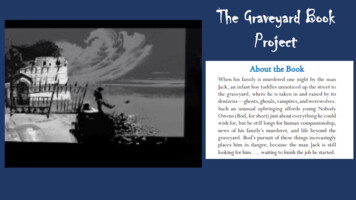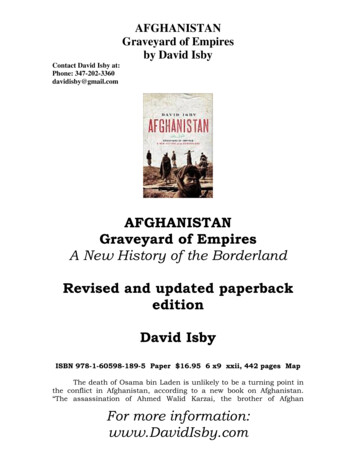
Transcription
AFGHANISTANGraveyard of Empiresby David IsbyContact David Isby at:Phone: d of EmpiresA New History of the BorderlandRevised and updated paperbackeditionDavid IsbyISBN 978-1-60598-189-5 Paper 16.95 6 x9 xxii, 442 pages MapThe death of Osama bin Laden is unlikely to be a turning point inthe conflict in Afghanistan, according to a new book on Afghanistan.―The assassination of Ahmed Walid Karzai, the brother of AfghanFor more information:www.DavidIsby.com
AFGHANISTANGraveyard of Empiresby David Isbypresident Hamid Karzai, is likely to have a more direct impact; he waspivotal in the current government‘s moves to consolidate power in thesouth‘, according to David Isby, author of Afghanistan, Graveyard ofEmpires. The book, which includes an afterword on the death on binLaden, sees his death as important for the US rather than Afghanistan,despite the fact that he was responsible for the deaths of more Afghansthan Americans.The death on bin Laden is not a victory in itself, but the war inAfghanistan is still winnable, but only if both the US and Afghans makeimmediate and forceful changes to enable them do what is necessary toprevent the Taliban from winning by default by waiting until the worldloses patience. The hope for a better life that led Afghans of allethnolinguistic groups to support the overthrow of the Taliban in 2001has deteriorated and needs to be revived through a cohesive strategy.This is the conclusion of Afghanistan, Graveyard of Empires, A History ofthe Borderlands, a revised and updated paperback edition of the book byDavid Isby, published by Pegasus Books in New York.The author, who has studied the conflicts in Afghanistan since theSoviet invasion in 1979, has published three previous books onAfghanistan, written extensively in journals such as USA Today, TheWashington Times, Jane’s Intelligence Review, Jane’s Defense Weekly andother publications, testified before House and Senate committees as anindependent expert, and has appeared discussing Afghanistan on CNN,Fox and Friends, PBS News Hour, the McLaughlin Group, C-SPAN, theBBC, the Voice of America and many other broadcasts.This is a book about Afghanistan, the Afghans and conflicts thathave come to define them both. The author sees Afghanistan as havingbecome a country defined by five distinct but interconnected conflictsthat are currently shaping its future, conflicts against the internationalterrorism of Al Qaeda, that against the insurgents, especially the Talibanmovement; that against narcotics cultivation and trafficking (Afghanistanproduces the vast majority of the world‘s supply of illicit opium), and,finally, Afghanistan‘s multifaceted internal conflicts. Pointedly, the fifthconflict that will shape the future of Afghanistan is not in that country atall, but in Pakistan, where the insurgency is essentially part of a singletrans-border conflict including Afghanistan.Pakistan‘s internalinstability threatens the future of its neighbors as well.For more information:www.DavidIsby.com
AFGHANISTANGraveyard of Empiresby David IsbyThe book sees Afghanistan‘s conflicts as having a direct impact onthe US. Al Qaeda planned and trained for the 9/11 attacks in Talibancontrolled Afghanistan. The Taliban insurgents the US are fightingrepresent a movement that has the potential to destabilize the threestrategic reasons bordered by Afghanistan: Pakistan and thesubcontinent, Iran and the Gulf and central Asia. A Taliban resurgencewould present a model of how Western influence can be forced out of anIslamic country by a radicalized minority with access to external support,here delivered through sanctuaries in Pakistan.While the book sees the long-running conflicts in Afghanistan as stillwinnable, losing – allowing the insurgents to achieve their goals –remains a real possibility unless US and Afghans alike change. USdisengagement from Afghanistan would be unlikely to reduce the impactof subsequent success by Al Qaeda and the Taliban and prevent futurethreats both to the US and to the stability of the regions.The author has spent much time on the ground in Afghanistanand Pakistan, starting in the 1980s. He has met, talked, argued withand listened to many of the leading figures on all sides of each of today‘sconflicts, as well as those from all walks of life. While the conflicts areabout many things, none is more important than what happens to thehope that Afghanistan had in such abundance when the Taliban fell in2001. What happens to that hope for a better future, whether it can berevived or if what remains of it will turn to dust and Afghanistan will facea future of seemingly limitless conflict, is the central issue of Afghanistan,Graveyard of Empires.For review copies or further information, contact:Jessica CasePegasus Books80 Broad Street5th FloorNew York, NY, 10004212-504-2924Jessica@pegasusbooks.usFor more information:www.DavidIsby.com
AFGHANISTANGraveyard of Empiresby David IsbyContact David Isby at:Phone: 347-202-3360davidisby@gmail.comAbout the AuthorDavid IsbyDAVID C. ISBY is a veteran observer of Afghanistan and Afghanwars. He is the author of three previous books on Afghanistan: WAR INA DISTANT COUNTRY: AFGHANISTAN, INVASION AND RESISTANCE,WAR IN AFGHANISTAN: THE SOVIET EMPIRE AT HIGH TIDE; andRUSSIA'S WAR IN AFGHANISTAN. He is also the author of, among otherworks, of books on the forces that fought in Afghanistan, WEAPONS ANDTACTICS OF THE SOVIET ARMY and ARMIES OF NATO‘S CENTRALFRONT (with Charles Kamps). He has written over 350 articles onnational security in International Defense Review, USA Today, TheNational Interest Online, Military Intelligence, Jane’s Defense Weekly,Defense News, CTC Terrorism Sentinel, Jamestown Terrorism Monitor, andmany other publications. He was an editor for Strategy & Tacticsmagazine and has designed several award-winning conflict simulations.A former congressional staff member and a Washington-based attorneyand consultant on national security issues, he has testified before bothHouse and Senate committees as an independent expert on Afghanistanand frequently appears in print and electronic media, including PBSNewsHour, CNN, VoA, C-Span, the McLaughlin Group, Fox and Friendsand others. He has lectured at staff colleges and other institutions onAfghanistan.For more information:www.DavidIsby.com
AFGHANISTANGraveyard of Empiresby David IsbyContact David Isby at:Phone: 347-202-3360davidisby@gmail.comQuotes and Reviews – David Isby―David Isby is a scholar with a broad understanding of both militaryhistory and the current situation‖. The Washington Times―Afghanistan, Graveyard of Empires is a comprehensive, exceptionallyresearched survey of the events, actors, and issues that have shaped thecurrent situation in this crucial region. It is highly recommended foranyone wishing to better understand the developments in post-9/11Afghanistan and Pakistan in the appropriate historical context‖. Journalof Military History―If you want to grasp what the Afghans, the United States, and theirWestern allies are up against, and will be fighting for the foreseeablefuture, read this book. Isby‘s depiction of that violently networkednetherworld is the most cogent description yet of the threat facingAfghanistan. This book is the best one on the subject – and it will be forsome time to come.‖ Sean M. Maloney, author of Fighting for Afghanistan:A Rogue Historian at War―David Isby‗s Afghanistan: Graveyard of Empires: A New History of theBorderland is a sweeping, insightful and authoritative account by one ofFor more information:www.DavidIsby.com
AFGHANISTANGraveyard of Empiresby David Isbythe leading experts on that country, who began trekking through itsrugged countryside in the early 1980s‖. The Washington Times―This is an excellent book for anyone who wants to develop a detailedunderstanding of the war in Afghanistan and gain a nuancedappreciation of the difficulty the U.S. faces in bringing it to a satisfactoryconclusion.‖ – Phi Beta Kappa Key Reporter magazine―An accomplished author‖. Ralph Peters―David C. Isby, an American defense expert, attorney and pilot‖ BritishArmy Review―David Isby gives his readers [in Leave no Man Behind] one of the mostthoroughly researched and well-written accounts to date of the high risksubset of Special Operations‖ Journal of Military History―Isby has written a volume that superbly analyzes the past with a clearlook to the future‖. Infantry [on Leave No Man Behind].For more information:www.DavidIsby.com
AFGHANISTANGraveyard of Empiresby David IsbyContact David Isby at:Phone: 347-202-3360davidisby@gmail.comSample Interview Questionsfor David IsbyDoes the death of bin Laden end the rationale for the US commitment toAfghanistan?Has the US military surge turned around the situation in Afghanistan?Has the Obama administration‘s rhetoric and policy been effective inAfghanistan?How is the Karzai governmentAfghanistan? Is it going to work?tryingtoconsolidatepowerinHow important is Pakistan and the situation there?Is Afghanistan worth a US commitment with its attendant cost in livesand money?Is Afghanistan Obama‘s Vietnam?Have the Taliban split from Al Qaeda? Is there any reason to assumethat Al Qaeda would be able to use Taliban-controlled parts ofAfghanistan to plan and train for terrorism as they did before 2001?Do the Afghans resent the US and foreign presence in their country?What changes have you seen in Afghanistan recently compared with theimmediate post-Taliban period?Are the five conflicts you talk about in Afghanistan primarily military?How quickly can we withdraw more troops from Afghanistan?Why is corruption a major problem in Afghanistan and what can be doneabout it?For more information:www.DavidIsby.com
AFGHANISTANGraveyard of Empiresby David IsbyWhy should the US support the Karzai government given its record withcorruption and election fraud?Is not Afghanistan so hostile to foreign forces and influence that the bestthing we can do, and what Afghans really want, is to end our presence?The US failed in Southeast Asia, in Lebanon, in Somalia, each timewithdrawing its troops and leaving in control the people we were fighting.None of these failures had an adverse effect on the United States or itspopulation. Why would failure in Afghanistan be any different?With the global economy still in the grips of the Great Recession and theUS confronting political crises at home, can we afford a commitment toAfghanistan?Is not Afghanistan a peripheral commitment, where we have neitherlong-standing links nor vital economic interests? Would we not be betterserved, in light of constrained US resources, in triaging Afghanistanaway?Is the Pakistani military America‘s enemy? Why are we giving them aid?Opium cultivation - what can be done about it?What has been your most memorable experience in Afghanistan?What have your experiences with Afghans been like?How did you become interested in Afghanistan?For more information:www.DavidIsby.com
AFGHANISTANGraveyard of Empiresby David IsbyContact David Isby at:Phone: 347-202-3360davidisby@gmail.comAn Interview with David IsbyAuthor of Afghanistan,Graveyard of EmpiresHas the death of bin Laden changed the conflict in Afghanistan?While bin Laden was important as a symbol and for his personal links tothe leadership of both the Taliban and transnational terrorism, his deathis unlikely to affect either or make it possible for the US or Afghanistanto change policies.Has not the death of bin Laden removed the US rationale forinvolvement in Afghanistan?He was more a symptom of the lack of involvement that marked USpolicy in the 1989-2001 period. This created a policy vacuum. Pakistan‘smilitary tried to take advantage of it, but were unable to do so. Theymade things worse. What emerged to fill this vacuum was bin Laden andtransnational terrorism.Is the assassination of President Karzai’s half-brother Ahmed WalidKarzai likely to have an impact?For more information:www.DavidIsby.com
AFGHANISTANGraveyard of Empiresby David IsbyThe death of Ahmad Walid Karzai was important. He was a key part ofthe government‘s political strategy. Karzai wants to consolidate politicalpower his way, on the model of the Durrani leaders of pre-conflictAfghanistan. This is going to be difficult to reconcile with all that haschanged in Afghanistan in the last 40 years, including the constitutionand elections that have taken place since 2001. But making it work asthe outside military commitment draws down is the single most crucialthing needed in Afghanistan.What’s really going on in Afghanistan?The insurgency in Afghanistan absorbs the vast majority of coalitiontroops and resources. But at the same time, threats from transnationalterrorism, narcotics trafficking and Afghanistan‘s internal conflictsundercut many of the policies that an effective counter-insurgencystrategy requires. All of these conflicts also are affecting Pakistan.Insurgency, terrorism, and a set of internal crises can to turn Pakistaninto the ultimate bad-dream scenario, a nuclear-armed failed state.Multiple conflicts in two countries ensure policies effective against anyone are likely to be counterproductive against the others.What matters most about the current conflict in Afghanistan?The US, the UK, and others are fighting a long and costly war, in terms ofboth casualties and money. The goal is to turn security in Afghanistanover to the Afghan National Security Forces by 2014, although theseforces will depend on outside aid for long after that. In many ways, this isa good thing. Minimizing outside involvement and increasing Afghanresponsibility will be part of any solution, The fundamental fact is thatthis war is about Afghanistan. Afghanistan‘s conflicts have their roots inevents that took place long before the US military intervention in 2001,after 9/11. In my book, I tried to always keep the focus on Afghanistanand the Afghans and, as far as it shapes the future of Afghanistan,Pakistan as well. Afghans, rather than the White House, the Pentagon,or the Congress, will have to put together the eventual solution.What should be the US policy objective in Afghanistan?Afghanistan is a war that needs to be won. What is at stake is muchgreater than preventing another 9/11 attack being prepared inAfghanistan. Losing in Afghanistan would not be like losing in Vietnam.For more information:www.DavidIsby.com
AFGHANISTANGraveyard of Empiresby David IsbyThe US forced to retreat like the Soviets would be a victory fortransnational terror. It would make them the wave of the future topeople throughout the Islamic world. The narrative that the Americanscame after us, but they could not beat us and now, we‘re back andthey‘ve gone home would be a compelling one.What should the US be doing to win the war in Afghanistan?Even the best US soldiers or the most caring aid workers can only do somuch. The most important thing Afghanistan needs from the US is tokeep the neighbors – especially Pakistan – from fighting out their ownproxy wars in Afghanistan. Aid to rebuild the infrastructure and humanresources and create a functional private sector economy has too oftenbeen absent since 2001.What do gMany policy arguments are really about the US rather than Afghanistan.To some, Afghanistan is another Vietnam, an open-ended foreign warthat threatens plans for widespread and expensive domestic socialreforms. Others invoke the US withdrawals from Lebanon in the 1980sand Somalia in the 1990s as potential lessons.There, the localpopulation felt the effects, rather than people in the US. In Afghanistan,Americans may not be as fortunate. People tend to make up theAfghanistan that best supports their own preferences in the highlypolarized US political environment rather than trying to come to gripswith unclear and often contradictory reality.Why should Americans care about Afghanistan?Afghanistan is a great place. The Afghans are wonderful people. Neitherdeserves what is happening.Yet United States policy towardsAfghanistan must be considered in terms of national interest. The USdisengagement from Afghanistan in the 1990s proved to be disastrousfrom that standpoint – it helped create the vacuum Al Qaeda filled – aswell as for the Afghans. The US supported countries such as theRepublic of Korea and Israel back when they were poor and weak. Today,they are neither. Afghanistan may never make it to their level. Americafought a bloody war in Korea, while Israel has never required US forces.US commitment helps them prosper despite neighbors that areadversaries and creates a world order where conflicts do not directlyFor more information:www.DavidIsby.com
AFGHANISTANGraveyard of Empiresby David Isbyaffect the life of the average American. The 9/11 attacks, planned inAfghanistan, aimed at destroying this order.--30--For more information:www.DavidIsby.com
AFGHANISTANGraveyard of Empiresby David IsbyContact David Isby at:Phone: 347-202-3360davidisby@gmail.comWhy I Wrote This Book:Afghanistan: Graveyard ofEmpiresDavid IsbyThe children seemed not to know what to make of it. But they could seethat their parents were happy and so they decided to smile and chatterwith each other. There were cameras and foreigners and much talking,and their parents seemed to think that great good would come of thatday‘s events. It was 21 March 2002; in Afghanistan, Nawroz (New Year‘sDay) of the year 1423 A.H. The schools were reopening throughout thecountry on the traditional first day of spring classes.The parents smiled at of the happy children, now clutching aid-donatedbooks and pencils handed them for the benefit of the cameras. ,Toothers at the ceremony, the children were evidence of how muchAfghanistan had changed in the few months since the US and itscoalition allies, through the use of a few hundred special operationsforces personnel and intelligence agents, supported by the judicious useof airpower, had enabled Afghanistan‘s Northern Alliance to topple theAfghan Taliban regime and their Al Qaeda patrons and drive them overFor more information:www.DavidIsby.com
AFGHANISTANGraveyard of Empiresby David Isbythe border into Pakistan. While they were in power, the Taliban hadbarred girls from attending school throughout most of Afghanistan asanathema to their fundamentalist vision of Islam. Boys‘ education hadbeen cut back. But today, boys and girls would go to school together inAfghanistan. The donated notebooks were an earnest of the promise ofoutside aid, making education available to them all. That was what hadmade their parents happy. Surely, the parents thought, with the Talibangone and the conflicts that had embroiled Afghanistan since 1978 finallyover, a bright future seemed to be opening up that morning along withthe schools.The reopening of Afghanistan‘s schools on Nawroz in 2002 was the firstact by an Afghan government that had been accepted and implementedcountrywide in Afghanistan since 1978. Then, the Communist putschhad been the first step in a long chain of events that plunged the countryinto the start what was to become decades of conflict. Since then,Afghanistan had always been a country at war. But on Nawroz, 2002,with the children clutching their donated books and going off to school,Afghanistan was a country full of hope. Afghans of all ethnolinguisticgroups were happy to see the end of the Taliban. They were sure thatthe international intervention that had brought it about was going to bethe start of a new and better era for Afghanistan.Today, some eight years later, there are over six million Afghan childrenin school (up from 750,000 in 2001), with a third of the primary schoolchildren being girls. But Afghanistan‘s hope, so bright and strong on theday the schools reopened, has faded. Afghanistan is once again acountry at war. Schools are burned by the Taliban as the creations of aninfidel invader, 1,089 in 2005-07 alone, more have since been destroyed.Teachers are killed or scared away as agents of a puppet government.Afghanistan has a lot of conflict and not much hope.The story of how Afghanistan went from a country at war to a countrywith hope and has now gone back again – and whether this can be haltedor reversed – is the subject of my book, Afghanistan: Graveyard ofEmpires. A History of the Borderlands published by Pegasus Books inNew York. A revised paperback edition has been published in July 2011.This is the fourth book I have written about Afghanistan at war. I havebeen studying Afghanistan and its conflicts for almost thirty years. Ihave also written reference books on the armed forces of the Soviet Unionand NATO that both, to their own surprise, have ended up fighting thereFor more information:www.DavidIsby.com
AFGHANISTANGraveyard of Empiresby David Isbyin conflicts that will determine their ultimate success or failure. Over theyears, I have traveled many times to Afghanistan and Pakistan. I sharedthe hope that was so abundant on Nawroz, 2002.It took a lot to go from the hope-filled Afghanistan of 2002 to the loomingcrises and multiple, overlapping conflicts of the present day. I wanted toshow how Afghanistan got there. . The Pakistanis offered a sanctuary tothe Taliban and much of Al Qaeda, seeing them as a way to influence thenew Afghanistan and hoping that, if they focused their aggressionagainst the government in Kabul, they would not turn on that inIslamabad. Drawing on the ―Taliban culture‖ that had taken root theresince the 1980s, a revived Taliban insurgency was able to bring aminority of Afghanistan‘s Pushtun population into arms against the newgovernment by 2005-06. Al Qaeda joined forces with Pakistan-basedterrorist organizations, previously limited to the conflict in Kashmir, andrallied them to strike back at infidels worldwide.I had seen the Afghans in bad times and, having shared their optimismin 2002, to see things go back again was a painful personal blow. TheAfghans were willing to take the short-term, self-interested view time andagain. The Afghans, while proud of the constitution they created, endedup practicing a divisive approach to internal politics that led to a cultureof corruption.In the US, the bipartisan consensus on Afghanistan that had enduredsince 2001 crumbled in the first nine months of the new administration.The Obama administration soon demonstrated that it perceivedAfghanistan primarily through the viewpoint of its US domestic politicaldimension. In the US, UK, Canada and other countries with troops inAfghanistan, the electorate is losing patience with the casualties and costof a commitment that is little understood and seems to offer nothing butunending frustration. As a result, the US and UK are reducing theirnumber of troops and Canada is ending its active combat role. Whatimpact this will have on Afghanistan and its enemies has received lessconcern. No government has been willing to expend resources to explainwhy, with 9/11 increasingly distant and bin Laden dead, the security ofpeople in the west is served in Afghanistan.So I wrote this book to explain how, with Afghanistan filled with hope, onthe day the schools reopened in 2002, today hope is in danger of dryingup and blowing away. How we – the US, the Afghans, everyone – wentfrom the hope-filled Afghanistan of March 2002 to the hope-imperiledFor more information:www.DavidIsby.com
AFGHANISTANGraveyard of Empiresby David IsbyAfghanistan of today was at the heart of what I wanted to tell ButAfghanistan is not lost past redemption or repair, even in the mostinsurgent-plagued districts or in the most corrupt ministries.It is important that hope be kept alive in Afghanistan, important not onlyfor the Afghans but for the countries in the regions that border them andalso for people in the US. Afghanistan has a real potential to affect theirlives. If the average American saw, when the recession went global in2008, how interlinked economies are, this conflict is showing threats offundamentalism and terrorism, unlike armies, cannot be containedacross oceans. Afghanistan was allowed to function as a haven forinternational terrorism under the Taliban. It was where Al Qaeda trainedfor and planned the 9/11 attacks. But even if Al Qaeda never came backto Afghanistan, if the Taliban insurgents end up back in power, it wouldnot only be dreadful for the people of Afghanistan it would encourage allthose that believe that the US, the West and their Moslem allies cannotstand up to radicalism. Terrorists will see a success greater than 9/11.The Muslim world will see that armed fundamentalism can triumph overwestern-supported democracy. This will have an impact throughout theworld. That I why I believe it is important to revive Afghanistan‘s hope.Afghanistan: Graveyard of Empires. A History of the Borderlands ispublished by Pegasus Books in New York. It is available at bookstoresnationwide as well as on-line at Amazon.Com, Barnes & Noble,Powells.com and elsewhere.--30—For more information:www.DavidIsby.com
AFGHANISTANGraveyard of Empiresby David IsbyContact David Isby at:Phone: 347-202-3360davidisby@gmail.comAfghanistan’s UnderlyingConflictsDavid IsbyThe current conflict in Afghanistan will not be won on the battlefield.Purely kinetic military actions constitute perhaps a fifth or a quarter ofwhat is required to prevail in the multi-faceted conflict of troops, livesand ideas represented by an insurgency. Using firepower against theTaliban may kill insurgents, but more will be recruited to replace themas long as the ―Taliban culture‖ remains strong among the ethnicPushtuns of Afghanistan and Pakistan.The Taliban movements in both Afghanistan and Pakistan aim to seizecontrol of the Pushtuns‘ rich and centuries-old culture, which many feelis besieged by change from outside. ―The most common Pushtun feelingis that there is a war on our culture,‖ is the sentiment according toMassoud Kharokhail of the Kabul-based Tribal Liaison Office, adevelopmental non-governmental organization (NGO). The insurgentsaim to mobilize this feeling to achieve political power, with the ultimategoal being the overthrow of the elected governments in both Kabul andIslamabad.Security and economic opportunity are vital to the people of Afghanistan.The campaign in the Kandahar area (Loya Kandahar), the focus of the2010-11 US military surge, aimed to bring these benefits to thepopulation of an area where the Taliban is strongly entrenched. In that,it has largely succeeded. But cultural issues also need to be part ofeffective counter-insurgency.The kinship-based and collectivist orientation of traditional Afghansociety is by no means limited to Pushtuns. It has led to suspicion of theinflux of ideas and media and the market economy of today‘s Afghanistan.The appearance of imported goods (unaffordable to most Afghans) andFor more information:www.DavidIsby.com
AFGHANISTANGraveyard of Empiresby David Isbythe large houses built by Afghanistan‘s political and business elites inKabul or in the Panjshir valley have given Afghans ample scope toexercise their propensity for envy that Mountstuart Elphinstone, the firstBritish envoy to Afghanistan, noted back in 1815. Afghan resentment ofthe West, while coveting its material gains, dates back to the nineteenthcentury. It became a powerful force cultural force post-2001 with theappearance of satellite television and bootleg Bollywood DVDs in everyvillage in Afghanistan. Afghans now compare their situation not withtheir neighbors, but with the outside world. While, in the past, theaverage Afghan was a devoted listener to shortwave radio broadcasts,today‘s media provides a much greater engagement with an outside worldthat does not reflect Afghan culture and does not appear to value it, yetfascinates and, often, repels the rural and uneducated majority.Afghanistan‘s insurgents have been able in some areas to transform thiscultural unease into active or passive support for their cause. Evenmany of the Taliban‘s Afghan enemies share their desire to defend theirculture against the outside world. Yet Afghanistan‘s deep culturalconservatism is by no means an across-the-board rejection of change ornostalgia for the Taliban. Afghans, even the most conservative, areproud of their political process and constitution, one reason why theTaliban felt compelled in 2006 to issue their own version, something thatthey had previously scorned as non-Koranic.Marginalizing the Taliban culture is important not only for the coalitionwar effort in Afghanistan, it is vital to ensure that the future of thediverse Pushtun people is not hijacked by those – Al Qaeda andPakistan‘s homegrown transnational terrorists among them – who woulduse them as the front rank in a global clash of cultures. The coalitionwar effort is missing someone to pull together all the diverse actions thatfighting a battle of ideas requires, with the skills of an Alastair Campbell(Tony Blair‘s spinmaster) or a Karl Rove. It will be difficult to bothnegotiate the cultural minefield and deal with the realities ofAfghanistan‘s dynamic media. Words coming from foreigners or theKabul government are viewed with distrust. In a country that isprofoundly religious, much of the cultural war must be waged in Islamicterms. This may require involving Moslem allies who wish to show theyare on the right side of the climate of change seen in recent months andto counter the Taliban‘s claim to fundamentalist legitimacy.Afghanistan‘s hard-bought military successes will be undercut if theenemy can win the cultural battle. The enemy in this battle is more thanFor more information:www.DavidIsby.com
AFGHANISTANGraveyard of Empiresby David Isbythe insurgents with Kalashnikovs, but those wearing business suits ormilitary uniforms in Pakistan, the Gulf, Saudi Arabia and elsewhere.They hope that, if the US follows the Soviets and limps away fromAfghanistan, they can use the momentum to mobilize Moslems aga
Graveyard of Empires A New History of the Borderland Revised and updated paperback edition David Isby ISBN 978-1-60598-189-5 Paper 16.95 6 x9 xxii, 442 pages Map The death of Osama bin Laden is unlikely to be a turning point in the conflict in Afghanistan,
